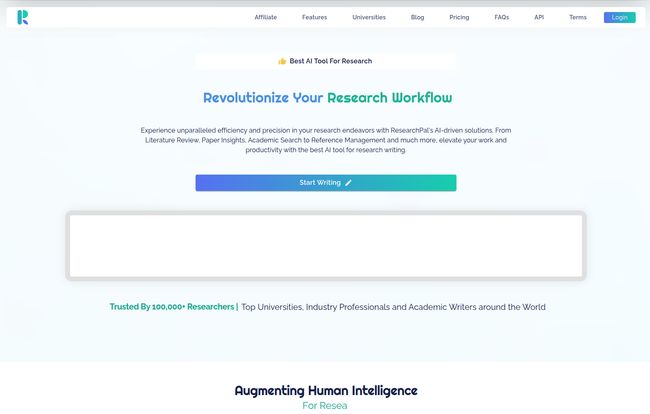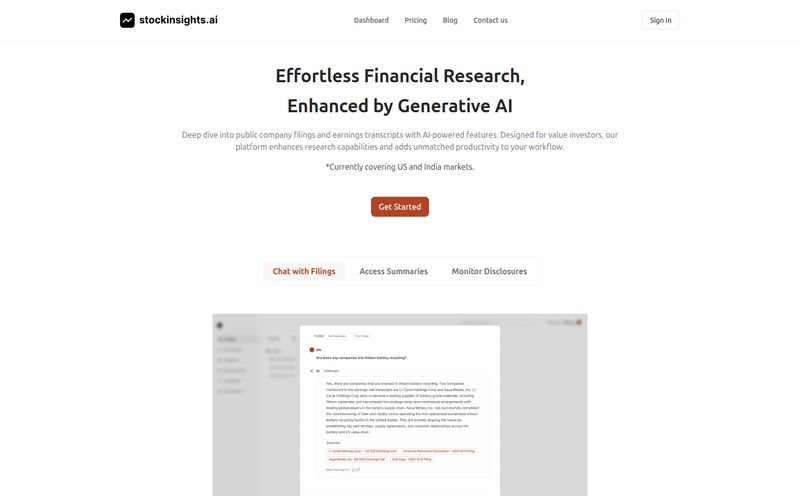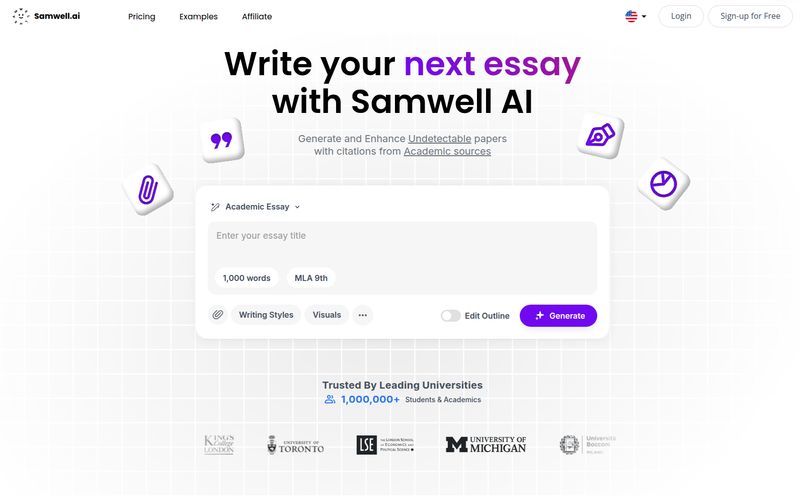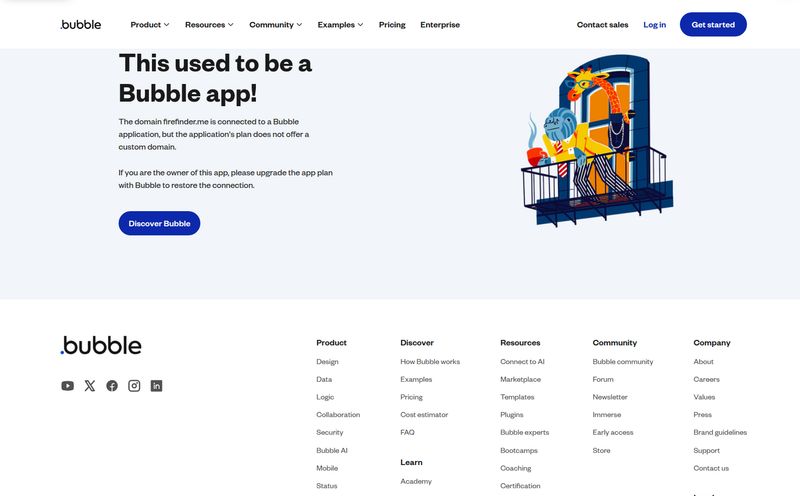If you're in academia or any research-heavy field, you know the grind. The endless papers to read, the soul-crushing literature reviews, the constant battle with citation managers... it’s a lot. I’ve spent more nights than I care to admit staring at a mountain of PDFs, fueled by stale coffee and a creeping sense of dread, wondering if I'll ever see the light of day again. The phrase “publish or perish” feels less like a motto and more like a threat, you know?
So, when a tool like ResearchPal comes along, waving a big shiny flag that says “AI-powered research assistant,” my ears perk up. But so does my skepticism. I’ve been in the SEO and digital marketing game for years, and I’ve seen my fair share of AI tools that promise the world and deliver a pamphlet. Can an AI really take on the beast that is academic research? Or is it just another fancy word processor? I had to find out.

Visit ResearchPal
So What Is ResearchPal, Anyway?
At its core, ResearchPal is designed to be your brain's sidekick. It's an AI platform built specifically for students, PhD candidates, R&D scientists, and academic writers. The whole point is to slash the time you spend on the grunt work of research so you can focus on the actual thinking and analysis. We're talking about automating literature reviews, getting instant summaries of dense papers, and even getting help with the writing and citing process.
It’s not trying to replace you as the researcher. The website itself says its goal is “Augmenting Human Intelligence.” I like that. It’s positioned as a collaborator, a super-smart assistant who can read faster than any human and never needs a coffee break. For anyone who’s ever felt like they're drowning in data, that’s a pretty appealing idea.
Diving Into The Core Features
Alright, let's get into the nuts and bolts. A tool is only as good as what it can actually do. Here’s a rundown of the features that caught my eye.
The Literature Review Magic Wand
This is the big one. The feature that probably makes most researchers' eyes go wide. ResearchPal claims to generate a literature review for your research question in seconds. Seconds. I’ve spent weeks on these things. You give it a question, and it scours its sources to pull together a review, complete with authentic citations. In my experience, the initial output is a fantastic starting point. It’s like getting a meticulously organized pile of clay; you still have to shape it, refine it, and add your own unique perspective, but you're not starting from a blank page. A massive, massive time-saver.
Chat with Your PDFs (No, Really)
This is another feature that feels like it’s from the future. You can upload research papers (in PDF format) and then just… talk to them. The “Paper Insights” and “PDF Chat” features let you ask specific questions about a document. For instance, you can upload a 50-page paper and ask, “What was the main methodology used in this study?” or “Summarize the key findings in three bullet points.” Bam. Instant answer. This is incredibly powerful for quickly vetting whether a paper is relevant to your work without having to read the whole thing cover to cover.
Your AI Writing Partner: The Text Editor
ResearchPal has a built-in, AI-powered text editor that’s more than just a place to type. It can rewrite sentences for clarity, change the tone to be more formal or concise, and even translate text. But the killer app here is the in-text citation functionality. We’ve all been there, painstakingly ensuring every claim is backed up and every reference is perfectly formatted in APA, MLA, or Chicago style. This tool helps you find and insert citations from credible sources as you write. It's not perfect, and you should always double-check its work, but it smooths out one of the most tedious parts of the writing process.
Seamless Integration with Your Workflow
I was genuinely pleased to see this mentioned in user testimonials. ResearchPal integrates with Zotero and Mendeley. If you’re a researcher, you know these names are gold. They are the go-to reference management tools for millions. The ability to pull your existing library into ResearchPal and sync your work is a huge plus. It shows the developers understand the actual, real-world workflow of their target audience, which is a detail many other tools miss.
The Good, The Bad, and The AI
No tool is perfect, right? It's always a balance. After playing around with ResearchPal, here’s my honest take on the pros and the… well, the things to be aware of.
What I'm Loving About ResearchPal
The biggest win is time. It’s just an incredible time-saving machine. The ability to generate a draft literature review or get the gist of a dense paper in minutes is a game-changer. I also appreciate the free plan; it’s not super generous, but it’s enough to let you properly kick the tires before committing any cash. The trust signals are strong too, with over 100,000 researchers and universities using it. It feels less like a fly-by-night startup and more like a serious academic tool.
A Few Things to Keep in Mind
First, don't get lazy. It's tempting to let the AI do all the work, but that’s a trap. The content it generates needs your critical eye, your voice, and your expertise to make it truly original and insightful. Think of it as a first draft, not a final product. Secondly, the elephant in the room: AI detectors. Some universities are, understandably, wary of AI-generated text. You absolutely need to refine, rewrite, and add your own analysis to anything ResearchPal produces to make it your own. If you just copy and paste, you’re asking for trouble. The free plan is also quite limited, so you’ll likely need to upgrade to get the full benefit on a real project.
ResearchPal Pricing: What's the Damage?
Okay, let's talk money. The pricing structure is pretty straightforward and caters to different levels of need. It’s broken down into three main tiers.
| Plan | Price (Monthly) | Best For |
|---|---|---|
| Free | $0 | Casual users or just testing the waters. It's quite limited (e.g., 5 paper uploads, 2 literature reviews), but it gives you a real feel for the platform. |
| Standard | $12 (or $9/mo if billed yearly) | The sweet spot for most students and individual researchers. You get unlimited projects, a generous number of uploads (150) and literature reviews (50), and access to powerful models like Google's Gemini 1.5 Pro. |
| Pro | $39.99 | Power users, R&D teams, and academics on a serious deadline. The limits are significantly higher (450 uploads, 150 insights), and you get access to top-tier AI models like OpenAI's GPT-4o and Claude 3.5 Sonnet. |
My take? The Standard plan probably offers the best value for the majority of people. The leap to Pro is substantial in price, so you’d want to be sure you need that extra horsepower and access to the absolute latest AI models.
Who Should Actually Use ResearchPal?
So, who is this really for? In my opinion, it’s a perfect fit for a few key groups:
- PhD and Master's Students: Especially when you're starting your dissertation or a major project and facing that initial mountain of literature.
- Academic Researchers & Faculty: Anyone needing to quickly produce papers, grants, or stay on top of the latest research in their field without spending all their time reading.
- R&D Professionals: Industry researchers who need to quickly analyze patents, technical papers, and competitor research to inform their work.
If you're a casual student writing a simple essay, it might be overkill. But for anyone engaged in serious, long-term research, the potential to reclaim hours—or even weeks—of your life is pretty darn compelling.
Final Thoughts: A Worthy Sidekick
After spending some quality time with ResearchPal, I’m walking away impressed. It’s not a magic button that writes your Nobel Prize-winning paper for you. But it's an incredibly powerful assistant that handles the most monotonous, time-consuming parts of the research process with impressive competence. It lets you, the human, do what you do best: think critically, connect ideas, and create something new.
Is it worth it? If you value your time and sanity, I'd say absolutely. It’s a tool that understands the pain points of research and provides smart, effective solutions. It won't replace your brain, but it might just give it a much-needed break.
Frequently Asked Questions
- Is ResearchPal really free?
- Yes, there is a permanent free plan! It's designed to let you test the main features, but it has limitations on how many papers you can upload and how many tasks you can perform. It’s a great way to try before you buy.
- Will my paper get flagged by AI detectors?
- This is a valid concern. If you simply copy and paste from ResearchPal, then yes, it might be flagged. The best practice is to use the generated content as a foundation—a starting point to be rewritten, fact-checked, and infused with your own unique voice and analysis. It's a tool for assistance, not replacement.
- What AI models does ResearchPal use?
- It depends on your plan. The platform uses a mix of powerful models. The paid plans offer access to premium models like OpenAI's GPT-4o and GPT-4 Turbo, Google's Gemini 1.5 Pro, and Anthropic's Claude 3.5 Sonnet, ensuring high-quality output.
- Can I delete my files and data?
- Yes, the FAQ on their site confirms that you have the option to delete your files, giving you control over your own data and research materials.
- Is it better than other AI writers like ChatGPT?
- While general AI like ChatGPT can be helpful, ResearchPal is purpose-built for academic research. Its features, like the literature review generator, PDF chat with citations, and Zotero/Mendeley integration, are specifically tailored to the research workflow in a way that general-purpose tools are not.
- Where are my uploaded files stored?
- According to their FAQ, user files are stored securely. As with any cloud-based service, it’s always a good idea to be mindful of the sensitivity of the research you upload.



